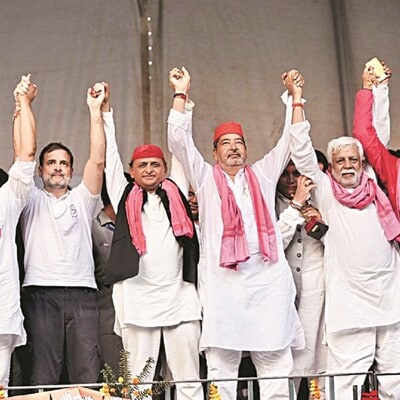Five years ago, the stellar performance of the Bharatiya Janata Party (BJP) across Uttar Pradesh and Prime Minister Narendra Modi’s resounding victory in Varanasi hid a series of tense electoral battles in nearly six Lok Sabha seats in districts close to this Lok Sabha constituency. Fast forward to the present day, and the political situation in Uttar Pradesh’s Purvanchal region is turning out to be relatively tough for the BJP and its allies Apna Dal and Suheldev Sharaf Samaj Party (SBSP).
Young people are expressing frustration that their dreams of getting government jobs have not been fulfilled, while a section of the Scheduled Castes see the Samajwadi Party (SP)-Indian National Congress alliance as a temporary refuge from the influence of the fading Bahujan Samaj Party (BSP). All this, coupled with the crisis of 2019, has made the rank-and-file members of the BJP and its allies a bit uneasy.
Click here to connect with us on WhatsApp
However, in the 2019 elections, the BSP, which was in alliance with the SP at the time, won in Ghosi and Ghazipur, while the BJP and Apna Dal (Soneilal) had to settle for narrow wins in other constituencies, except Varanasi and Mirzapur. For example, in Chandauli, Pandey defeated the SP candidate by 13,959 votes. The BJP’s then Bahria candidate, Virendra Singh, defeated the SP’s Sanatan Pandey by 15,519 votes. The Apna Dal (Soneilal) won in Robertsganj by 54,610 votes.
The SP’s strategy of fielding candidates from a broader caste group than just Yadavs has led to speculation that support may shift among the smaller Other Backward Castes (OBCs). This is particularly evident in the Scheduled Caste Robertsganj constituency, where the SP fielded BJP candidate Chhotelal Karwar in the 2014 election. In Mirzapur, the SP fielded Ramesh Chand Bhind, a former BJP MP from neighbouring Bhadohi in 2019. BSP’s Gazipur MP Afzal Ansari is currently the SP’s candidate.
“The tone of this election has shifted from nationalism to caste, with the Indian National Congress following the BJP’s lead in reaching out to the so-called ‘Rabarti Vargh’,” said Aflatoon Desai, a Varanasi-based political activist with the Samajwadi Jan Parishad.
Desai has been courting pro-India support among Dalits in Varanasi, Mirzapur and villages in neighbouring constituencies.
However, BJP spokesman KK Sharma remains confident, saying the credibility of the prime minister’s assurances is a key factor for the party. “He (Modi) has delivered on his promises, but the credibility of the opposition’s assurances is untested.”
The question of how SCs and OBCs will vote as beneficiaries of government welfare schemes, along caste lines or as the “four pillars” of “youth, women, farmers and the poor” remains unresolved. At a rally in the area, Indian National Congress leader Rahul Gandhi promised to fill three million government vacancies, provide free ration and ensure farm loan waivers, while PM Modi spoke about his humble origins, the central government’s Vishwakarma scheme for OBCs and the opposition’s “attempts to strip reservations”. On Tuesday, Rahul claimed that the GST would be “catastrophic” for Varanasi’s weavers and toy makers. This came a day after BJP leader JP Nadda addressed weavers in the constituency.
Talking to young people in Varanasi, the resonance between both stories becomes clear. Rohit Gupta, a young e-rickshaw owner, laments the lack of government jobs and declining trade for Banarasi saris. “The trade has shifted to Gujarat and other parts of the country. Orders have gone down and so has the commission I earn selling saris,” Gupta says. “I am a college graduate. It goes against my dignity to do this job (e-rickshaw driver). It is the government’s fault for not filling up government vacancies.”
Meanwhile, autorickshaw driver Suryakumar Keshri sees a future in self-employment, as improved infrastructure has led to an increase in tourists. “I’m not looking for a job,” said Keshri, who claims to have studied up to high school. He “trusts” Modi’s promises.
As the political drama unfolds, one thing is clear: there are no easy answers in the labyrinthine back alleys of Varanasi.
He astutely points out that aspirations such as getting a government job are linked to one’s social and educational background.

